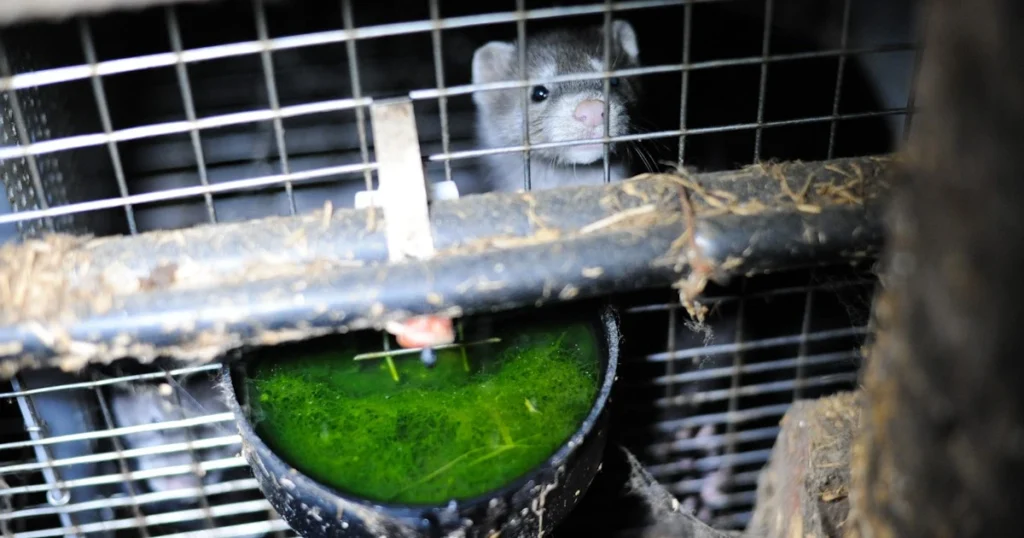
Photo by We Animals
The Fur-Bearers submitted a brief to the Senate of Canada over statements made about the COVID-19 outbreaks on British Columbia mink farms from 2020-2021. This brief was submitted to the Standing Committee on Agriculture and Forestry, which is currently reviewing Bill C-275, a federal ag-gag bill.
The Committee heard testimony from Robert Bollert, who was president of the Canada Mink Breeders Association when the COVID-19 outbreaks on BC’s mink farms occurred during the COVID-19 pandemic. Click here to watch the full testimony.
In a response to questioning from Senator Paula Simons, Mr. Bollert stated that it isn’t known how mink became infected with the SARS-CoV-2 virus on British Columbia mink farms, and that “really strict biosecurity protocols” were put in place in the early years of the pandemic. The Fur-Bearers’ submission to the Senate provides evidence that clarifies these inaccurate statements, which is summarized below.
Fact check: Is it the case that public health authorities do not know how mink became infected with the SARS-CoV-2 virus on British Columbia’s mink farms?
In their investigation into two of the SARS-CoV-2 outbreaks in British Columbia, public health researchers identified farm staff as the likely cause of the outbreaks, and found that both human-mink and mink-human transmission of the virus occurred: “These findings point to a likely anthropogenic introduction of SARS-CoV-2 into farmed mink by farm staff, viral evolution in the mink host and then reintroduction into human hosts.” (Page 279)
Fact check: Is it the case that there were “really strict biosecurity protocols” in place in the early years of the pandemic on British Columbia’s mink farms?
The Fur-Bearers cited evidence from peer-reviewed articles and WorkSafeBC mink farm inspections to show that the mink farm industry did not have strong biosecurity protocols in place leading up to and during the COVID-19 outbreaks.
Research from public health authorities involved in the response to and management of the disease outbreaks repeatedly identified weak implementation of biosecurity measures on British Columbia’s mink farms.
WorkSafeBC inspection reports documented numerous contraventions of the Workers Compensation Act and Occupational Health and Safety Regulation by multiple mink farms. Issues observed by inspectors included employers failing to establish COVID-19 Safety Plans, an employer and workers not wearing Personal Protective Equipment (PPE), no handwashing stations, soap, or paper towels in designated areas, blood and biological materials contaminating various surfaces and machinery, no protocols to address decontamination and absence of proper hygiene controls, and no written procedures for workers to reference for handling live and dead mink in order to protect themselves from COVID-19 transmission.
Three BC mink farms experienced COVID-19 outbreaks in 2020-2021. In 2021, officials captured three escaped minks infected with the SARS-CoV-2 virus on a BC mink farm. This ultimately resulted in a moratorium on mink farming by the Provincial Health Officer in July 2021, who stated mink farming endangers public health. The moratorium was followed by a provincial mink farming ban, announced in November 2021, due to the sector’s public health risks.
Bill C-275 implications
Bill C-275 seeks to introduce severe penalties for anyone entering agricultural operations without lawful authority, if they could reasonably be expected to introduce diseases or toxic substances to animals. But in its current wording, the bill fails to impose the same harsh penalties on the operators of those facilities if they are the ones responsible for (or reasonably be expected to cause) disease outbreaks. As the experience of the COVID-19 outbreaks on British Columbia’s mink farms demonstrates, the real disease risks come from within the fur farm sector.
Take Action!
British Columbia recognized the public health risks of fur farming and banned mink farming in 2021. As more and more countries around the world take decisive action to protect the public by banning fur farming, it’s time for Canada to act. Join the movement to end fur farming in Canada by visiting our new campaign website.
Click here to take action and send a letter to your federal elected representative.
